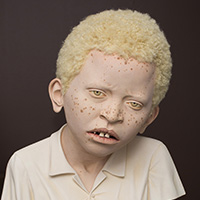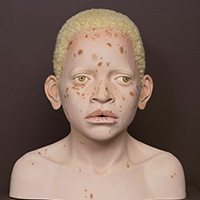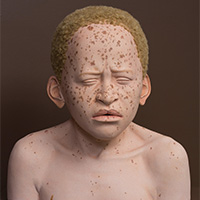2013-2014
THE PERSECUTION OF PEOPLE WITH ALBINISM IN TANZANIA
Albinism is an inherited condition caused by two recessive genes that results in a lack of melanin–the pigment that gives color to the skin, hair, and eyes. Albinism is a fairly rare condition, appearing in roughly one in 20,000 people. Its prevalence is far more common in parts of Eastern Africa, occurring in nearly one in 1,400.
In Tanzania, horrific acts of mutilation have been taking place due to prejudice, ignorance, and superstition. According to lore, people with albinism are viewed as ghosts or bad omens. Despite this delusion, indigenous shamans have conjured up magical potions from body parts to bring wealth and good luck. Potions have been used in a variety of contexts: gold miners have poured them on the ground and fishermen have poured them on their nets or in their canoes. Living people are attacked and mutilated for their arms, legs, hair, genitalia, and blood. Ultimately the bottom line from these superstitions and prejudices is economic—in a country in which the average annual income is less than $450, a limb from a person with albinism can bring anywhere from $500 to $2,000.
Africa is finally awakening to this tragedy. Shamans that create the magic potions are having their licenses revoked in Tanzania, boarding schools have been opened for children with albinism, and people with albinism have been appointed to positions in the Tanzanian Parliament. And while poachers have been arrested and sentenced to death for human mutilation, the life of a person with albinism in Tanzania and neighboring countries remains one rightfully fraught with paranoia and anxiety.





